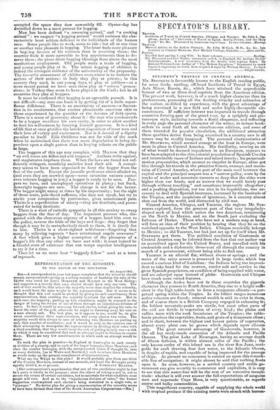REPRESENTATION OF THE MINORITY. TO THE EDITOR OP THE SPECTATOR.
4th August 1941.
Sin—A correspondent in your last paper complains that the minority Should Pettnin unrepresented—giving as a strong instance of hardship the case of the 12,000 who voted for Lords MORPETH and MILTON in the West Riding; and suggests as a remedy that each elector should have only one vote. The evil of that would be, that unless the majority more than doubled the minority, each would have the same weight in the representation. But it seems to be thought that this evil would be avoided by giving to each constituency three representatives, thus enabling the majority to return the odd man. But in inch case, the majority, putting up two candidates, might be exposed to the danger of losing the return of one of them through an injudicious division of Votes. In fact, it would be necessary for each elector, before giving his vote, to know the state of the poll, otherwise he might be throwing away his vote on man already safe. The best plan, as it appears to me, would be, to give every constituency three representatives, and every elector two votes. The majority would then always be sure of returning two Members on putting up only that number of candidates ; and it would be only in the extreme case of their attempting to monopolize the representation by dividing their votes with a third candidate, that they would incur the risk of getting in only one—a risk
m i to which it
ay be considered that such an attempt ought n fairness to expose them. There are very few constituencies in which such an attempt would be made.
To work the plan in practice—in England at least—give to each county or division of a county, and to each of the larger boroughs, three Members; and class the smaller boroughs, with the unrepresented towns if thought fit, into as many districts, (as in Wales and Scotland,) each to return three Members, as would make up the present complement of representatives. What say the Whigs to this plan ? It would probably give them one-third of the County Members, instead of one-seventh, and leave the Boroughs pretty [Our correspondent's apprehension that one of two candidates might be lost to a party is hardly to the purpose; since the object of taking a poll is, not to secure the return of certain candidates, but to ascertain for what candidate most people will vote. And as to the "injudicious division of votes," the former suggestion contemplated each elector's being restricted to a single vote, or "plumper." /go better plan for giving a representation of the minority seems to have been devised than that of the South Australian Corporations.—En.]


























 Previous page
Previous page